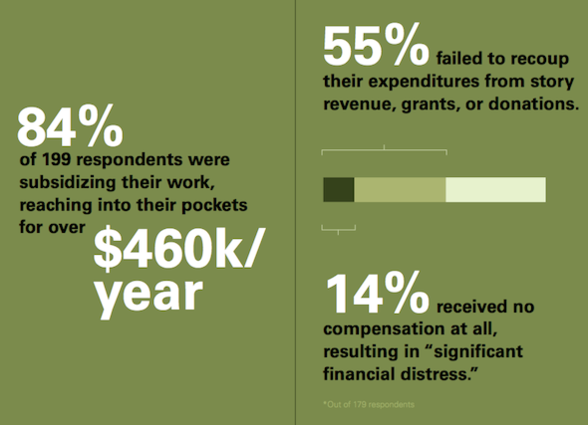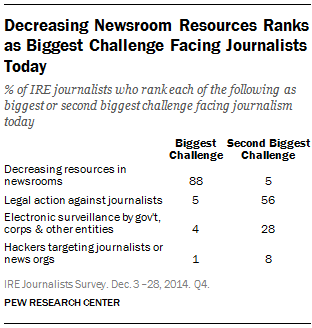
Image from CJR
Two posts this month painting very different pictures of investigative journalism in the second decade of the 21st century.
On the Global Investigative Journalism Network (GIJN) Brant Houston tracks the paths of investigative journalists who either lost or left their jobs towards the end of the noughties. While some took up investigative positions outside of journalism others “decided to create their own newsrooms”
“Laura Frank [set up] ProPublica … In Seattle, journalists from the Post-Intelligencer started Investigate West and also secured offices in the local PBS station. In San Diego, the former editor and metropolitan editor of the San Diego Union Tribune launched The Watchdog Institute, now an online media outlet called inewsource. It found offices in the local PBS station and at San Diego State University.
“In Wisconsin, Illinois, and Massachusetts, journalists began investigative newsrooms at universities, either as a part of journalism departments or under memorandums of understanding”
Some would later come together to form the Investigative News Network (INN).
And then the tide began to turn.
“Since 2009, many for-profit newsroom editors … Rather than cutting back on their teams, expanded and focused on that work. The Dallas Morning News,Minneapolis Tribune, and the Milwaukee Journal Sentinel were among metropolitan newspapers that maintained or increased the number of their investigative reporters.
“Online magazines have also entered the business: BuzzFeed has created an investigative desk and Quartz is publishing investigations … In television and video, Vice News started in December 2013.”
The worst of times for investigative journalists
So a golden age for investigative reporting? Not if you ask freelance investigative journalists, according to Laird Townsend.
“Over the past five years, declining pay and other resource constraints have prevented at least 500 to 1,000 stories from reaching the public and caused several hundreds of freelancers to drastically curtail their reporting in the public interest,”
The figures come from Project Word, a report based on a 2014 survey of over 200 freelance investigative journalists across 26 countries.
Freelance investigative journalists, it says, are being paid less and anxious about finances. They spend the majority of their time doing other work to subsidise their reporting, and are “reaching into their own pockets to fund their investigative work”.
Meanwhile, back on GIJN, another report based on a survey of 671 members of the Investigative Reporters and Editors network suggests decreasing newsroom resources are a bigger concern than surveillance for investigative journalists, with 88% rating it as their top concern.

Table from GIJN
